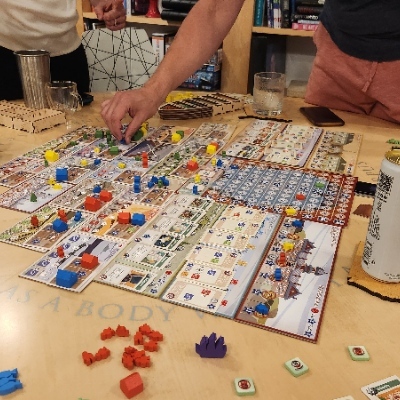The next fad after companion apps?
Integrating AI into electronic games is hard, let alone tabletop or board games, and Hasbro’s shown the capacity to fuck up the much easier task of “sit on the legendary DND IP, let it function, and just sit back and count the river of money that floods in to you as a result.” If Hasbro’s performance at operating the DND brand is anything to go by, traditional board game designers have not a lot to worry about in the near future I think.
But in typical fashion, hasbro understands nothing about d&d and will probably almost destroy their property, again.
Yep. There were rumors of them implementing AI DMs already around the time of the OGL fiasco. I predict that they will ham-fistedly implement some kind of AI tabletop system, it will be hilariously bad, and the evolution of DND into some weird no-longer-a-fad thing will continue apace (with the genuine tabletop fans moving to Pathfinder / Dungeon Crawl Classics / etc, and the casuals going back to just doing something else.)
I kind of expect them to fick it up so bad they sell it off and hopefully someone better acquires it then. But I doubt I’ll learn any edition past 5th. What I have right now does everything I need it to when I run a fantasy adventure
So I haven’t actually run any Pathfinder games, but I’ve bought the book and looked it over, and it looks to me like it addresses a bunch of stuff that was annoying to me when I ran 5e games. I actually didn’t feel 5e did everything I needed it to – e.g. the guidelines for treasure are totally wack (and then there’s this insulting refrain of “Well you know, every game is different! Just do what you feel!” as if that’s an excuse for not providing a working out-of-the-box economic system I can reference), the CR system doesn’t really work that well and you have to get a feel for how to balance encounters totally separate from the guidelines, etc.
When I read the Pathfinder book and found an extremely specific guideline of how much gold, how many permanent items, and how many consumable items, an average party should get at each specific level if you want a generally balanced economy, and every item is categorized according to rarity + GP value + “level” at which it’s probably appropriate, I felt like shouting “FUCKING YES” because that’s what I was looking for in the DMG and fumbling around trying to create for myself when I didn’t find it. It does have treasure guidelines but they are very obviously just a bunch of non-working nonsense.
Ask me if I’m salty about this still lol.
I definitely don’t assume that. In fact, I think they’re far more likely to make a ham-fisted mess of it.
I’m not trying to throw shade here at the 5e designers, who are clearly smart people who care about the game, but I would say the result of what Hasbro is doing with the brand is actually pretty un-mixed, of cash-grab content with clearly evident flaws, in contrast to systems like Pathfinder that are designed to be well-designed and enjoyable systems.
If you integrate the digital into an analog game, it’s no longer an analog game. It’s now a video game with a physical dongle. Looking at you LoTR:JtME!
Did it sold well?
Just… make… it… fun and I’ll play and don’t make me sign up for a service or give away my data.
The only way to truly implement something like this would be with a digital board game framework similar to the Teburu system, which is an overpriced and uninspired bloated piece of junk. I have played around with my friend’s version as he was trying to sell it to me, it only has a few games for it and they are hundreds of dollars each. Each game has loads of bugs and every time he gets it out it needs to be charged, receives multiple updates, has tons of hoops to jump through just to play. When we finally set it up, he realized his dice wasn’t charged. This type of thing is exactly the opposite of classic board games that are just analogue pieces you can set up and play any time, even by candlelight. I don’t see AI driven board games gaining any traction, especially since the frameworks needed to house them aren’t really well done either. And honestly, we don’t need it. Games are well designed enough to provide lots of branching options and paths to victory. AI is just a buzzword people are trying to shove into everything.
An excerpt:
AI-driven game mechanics excite board game enthusiasts, opening doors to more immersive and realistic gameplay. By delegating behind-the-scenes decision-making to AI algorithms, players can focus on the action unfolding before them rather than getting bogged down by complex behavior cards or rule sheets. Xplored envisions a board game landscape that mirrors video games, where meeples and tokens become dynamic counterparts to the traditional controller.
While the promise of AI in board games holds immense potential for enhancing entertainment value, some cautious voices raise concerns about the potential impact on creative workers. Drawing parallels with the entertainment industry’s experimentation with AI-written scripts amid labor strikes, some fear that an AI-driven approach could lead to unemployment and obscurity for board game designers. Having previously flirted with the tech trend of NFTs, Hasbro is not immune to the allure of Silicon Valley’s latest golden geese, including Kickstarter and blockchain.
By delegating behind-the-scenes decision-making to AI algorithms[…]
This line is a bit confusing, because this doesn’t sound like it requires an “AI” in the LLM sense, it sounds like a few if-statements.
I would be curious to see how exactly an LLM could be integrated into a board game, but for that - as always - I’ll be keeping an eye on the indie space.
There’s no chance a corporation like Hasbro will do anything more than slapping the “AI” label on it and letting the shareholder dollars to roll in.
An LLM is a specific type of AI, and honestly one that’s a useless novelty at best and the death of information on the internet at worst. Machine learning has been used in chess for literal decades before LLMs, is Stockfish “a few if statements”?







